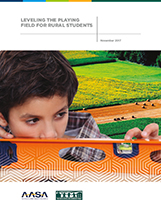Rural Leaders Count on AASA's Advocacy
October 01, 2018

While rural schools individually may be small, they collectively serve a large portion of this nation’s public schools, about 18 percent of total enrollment. Rural superintendents are among their strongest advocates.
That is a principal
reason AASA was pleased to create a formal partnership in 2017 with the Rural School and Community Trust to ensure federal policy and programs proactively consider the unique opportunities and obstacles facing the nation’s rural schools and
the students and communities they serve.
AASA is no stranger to rural education advocacy. Nearly two decades ago, the association helped create the Rural Education Achievement Program, now codified in the Every Student Succeeds Act. We
work on several programs designed specifically to support rural schools and communities, including the Secure Rural Schools/Forest County program and the Impact Aid program, as well as broader programs that support rural schools, such as E-Rate, Medicaid
claiming for schools, ESSA Title I, ESSA Title IV and IDEA.
These federal policies provide critical funding and services that allow rural schools to offer academic programming and help to level the playing field for rural and geographically
isolated communities, which are more likely to struggle with teacher shortages, the capacity to afford teachers and high-cost programs or to have sufficient student enrollment to warrant particular programs that are widely available in larger settings.
AASA monitors everything from proposed and current law to regulations, guidance and technical assistance at the federal level, working to ensure we understand the potential impact for rural school superintendents and their students and to
improve these proposals before they become final. We relay what we learn to our members, so they too can weigh in with their congressional delegations.
The voice of a school superintendent carries a lot of weight on Capitol Hill, and feedback
from rural school system leaders helps bring to life the real benefits, obstacles and unintended consequences that arise when proposed policy transitions into a real program.
Author
Advertisement
Advertisement
Advertisement
Advertisement




